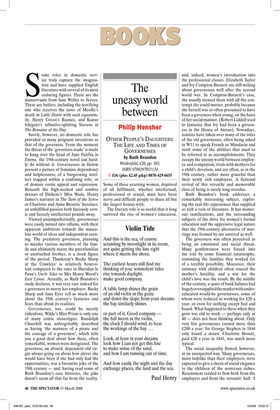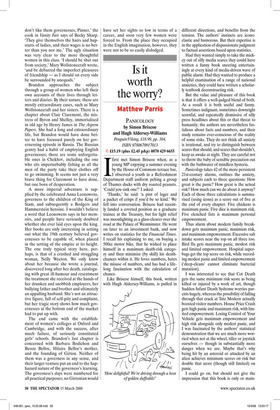The uneasy world between
Philip Hensher
OTHER PEOPLE’S DAUGHTERS: THE LIFE AND TIMES OF GOVERNESSES by Ruth Brandon Weidenfeld, £20, pp. 303, ISBN 9780297851134 ✆ £16 (plus £2.45 p&p) 0870 429 6655 Some roles in domestic service truly capture the imagination and have supplied English literature with several of its most enduring figures. There are the manservants from Sam Weller to Jeeves. There are butlers, including the terrifying one who receives the news of Merdle’s death in Little Dorrit with such equanimity, Henry Green’s Raunce, and Kazuo Ishiguro’s infinitive-splitting Stevens in The Remains of the Day.
Surely, however, no domestic role has provided so many poignant inventions as that of the governess. From the moment the threat of the ‘governess-trade’ is made to hang over the head of Jane Fairfax in Emma, the 19th-century novel can hardly do without it. Governesses in fiction present a picture of feminine dependency and helplessness; of a burgeoning intellect trapped within a confining role; or of demure erotic appeal and repression. Beneath the high-necked and sombre dresses of Dickens’s Miss Wade, Henry James’s narrator in The Turn of the Screw or Charlotte and Anne Brontës’ heroines, an unfulfilled passion both furiously erotic and fiercely intellectual pounds away.
Viewed unsympathetically, governesses were easily turned into villains, with their apparent ambitions towards the masculine world of ideas and independent earning. The predatory governess, planning to murder various members of the family and ultimately marry the paterfamilias or unattached brother, is a stock figure of the period. Thackeray’s Becky Sharp at the Crawleys’ is relatively benevolent compared to the ones in Sheridan le Fanu’s Uncle Silas or Mrs Henry Wood’s East Lynne. Actually, as Ruth Brandon’s study declares, it was very rare indeed for a governess to marry her employer. Becky Sharp and Jane Eyre tell us much more about the 19th century’s fantasies and fears than about its realities.
Governesses, too, could be merely ridiculous; Wilde’s Miss Prism is only one of many comic stereotypes. Randolph Churchill was unforgettably described as having ‘the manners of a pirate and the courage of a governess’, which tells you a good deal about how these, often remarkable, women were denigrated. The governess, an absurd, dependent old virgin always going on about how clever she would have been if she had only had the opportunities, was a favourite joke of the 19th century — and, having read some of Ruth Brandon’s case histories, the joke doesn’t seem all that far from the reality. Some of these yearning women, deprived of all fulfilment, whether intellectual, professional or sexual, must have been nervy and difficult people to share all but the largest houses with.
The literary role is so useful that it long survived the rise of women’s education, and, indeed, women’s introduction into the professional classes. Elizabeth Taylor and Ivy Compton-Burnett are still writing about governesses well after the second world war. In Compton-Burnett’s case, she usually treated them with all the contempt she could muster, probably because she herself was so often presumed to have been a governess when young, on the basis of her social manner. (Robert Liddell used to fantasise that Ivy had been a governess in the House of Atreus). Nowadays, nannies have taken over many of the roles of the old governesses, often being asked in W11 to speak French or Mandarin and instil some of the abilities that used to be referred to as accomplishments. They occupy the uneasy world between employee and companion, rivals with mothers for a child’s devotion, and are often, as in the 19th century, rather more graceful than their newly rich employers. A fictional revival of this versatile and memorable class of being is surely long overdue.
Ruth Brandon’s book addresses a remarkably interesting subject, exploring the real-life experiences that supplied so rich a vein of literature. It has numerous ramifications, and the surrounding subjects of the drive for women’s formal education and the oppressive legal nature that the 19th-century alternative of marriage was formed by are covered as well.
The governess was often perceived as being an emotional and social threat. Many gentlewomen were forced into the role by some financial catastrophe, reminding the families they worked for of a terrible possibility. Moreover, their intimacy with children often roused the mother’s hostility, and a war for the child’s love was the result. By the middle of the century, a spate of bank failures had hugely oversupplied the market with undereducated would-be governesses, some of whom were reduced to working for £20 a year, or even for nothing except bed and board. What happened to these when they grew too old to work — perhaps only at 40 — does not bear thinking about. Only very few governesses earned more than £200 a year; Sir George Stephen in 1844 only found a dozen. Charlotte Brontë, paid £20 a year in 1841, was much more typical.
The social inequality flowed, however, in an unexpected way. Many governesses, more ladylike than their employers, were expected to give a sheen of social elegance to the children of the nouveaux riches. Resentment tended to flow both from the employers and from the servants’ hall. ‘I don’t like them governesses, Pinner,’ the cook in Vanity Fair says of Becky Sharp. ‘They give themselves the hairs and hupstarts of ladies, and their wages is no better than you nor me.’ The ugly situation was very clear to the more thoughtful women in this class. ‘I should be shut out from society,’ Mary Wollstonecraft wrote, ‘and be debarred the imperfect pleasures of friendship — as I should on every side be surrounded by unequals.’ Brandon approaches the subject through a group of women who left their own accounts of their lives through letters and diaries. By their nature, these are mostly extraordinary cases, such as Mary Wollstonecraft and her sisters. There is a chapter about Clair Claremont, the mistress of Byron and Shelley, immortalised in old age by Henry James in The Aspern Papers. She had a long and extraordinary life, but Brandon would have done better to have focussed purely on her governessing episode in Russia. The Russian gentry had a habit of employing English governesses; there are some unforgettable ones in Chekhov, including the one who sits imperturbably fishing as all the men of the party take their clothes off to go swimming. It seems not just a very brave thing for Claremont to have done, but one born of desperation.
A more imperial adventure is supplied by the celebrated Anna Leonowens, governess to the children of the King of Siam, and subsequently a Rodgers and Hammerstein heroine. I wouldn’t believe a word that Leonowens says in her memoirs, and people have seriously doubted whether she ever laid eyes upon the king. Her books are only interesting in setting out what the 19th century believed governesses to be capable of, when placed in the setting of the empire at its height. The one truly typical story here, perhaps, is that of a crushed and struggling woman, Nelly Weeton. We only know about her because she wrote a journal, discovered long after her death, cataloguing with great ill-humour and resentment the treatment she received at the hands of her drunken and snobbish employers, her bullying father and brother and ultimately an appalling husband. She’s not an attractive figure, full of self-pity and complaint, but her tragic story shows how much governesses at the bottom end of the market had to put up with.
The end came with the establishment of women’s colleges at Oxford and Cambridge, and with the success, after much failure, of seriously constituted girls’ schools. Brandon’s last chapter is concerned with Barbara Bodichon and Bessie Belloc, Hilaire Belloc’s mother, and the founding of Girton. Neither of them was a governess in any sense, and their larger venture put an end to the haphazard nature of the governess’s learning. The governess’s days were numbered for all practical purposes; no Girtonian would have set her sights so low in terms of a career, and soon very few women were forced to. From the place they occupied in the English imagination, however, they were not to be so easily dislodged.



























































































 Previous page
Previous page